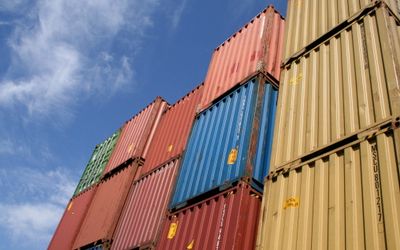ECONOMY: NDP Africa beckons but few are going
by Johann Barnard,
2014-11-20 07:01:52.0
THE Trade and Industry department has mooted the establishment of an export council to focus specifically on exports to the rest of Africa. Given the non-cooperation and dearth of information from government officials however, it is impossible to say if such a council is indeed being set up.
Industry players say such a council will prove highly valuable in terms of increasing exports to the rest of the continent — for example, only 4% of all SA’s fresh fruit is exported to Africa. However, one export consultancy says while the market is aware of the department announcement on the council there have been no developments.
Deputy Minister of Trade and Industry Mzwandile Masina announced that the export council would be formed during the department’s budget vote address in July this year. This entity is also identified in the medium-term strategic framework as one that is to be established within the first year of the 2014-2019 iteration of the MTSF. The department plays a significant role in facilitating the country’s manufactured and fresh produce exports and is a partner with the many industry-specific export councils. None of those contacted, however, were any clearer on this proposed new entity.
They all agree, however, that Africa holds great potential for the country as an export destination given SA’s proximity to markets in sub-Saharan Africa. This does not, however, mean that it is either cheap or easy to access these markets.
This is most strikingly evident, suggests Justin Chadwick, CEO of the Citrus Growers Association, in that shipping fresh produce to Ghana is as costly as it is to Rotterdam in the Netherlands.
Challenges related to logistics infrastructure, limited in-country distribution and trade networks are seen as some of the major stumbling blocks.
Anton Kruger, CEO of the Fresh Produce Exporters’ Forum, says the two main challenges for fresh produce exporters are maintaining the cold chain to maintain the high quality of South African fruit, and financial systems to ensure reliable lines of credit.
He suggests that the proposed export council could aid exporters by co-ordinating the efforts of relevant government departments to address issues such as export certification, market access and trade negotiations and agreements.
“One practical form of assistance could be for them to conduct viability studies in terms of logistics and financial systems to show which countries we need to target,” he says.
One opportunity identified by both Kruger and Chadwick is to piggy-back on the efforts of retail chains in setting up operations around the continent. Sectors such as fresh produce and basic manufactured goods would benefit from being able to take advantage of pre-existing relationships and familiar supply chain and financial systems.

Picture: THINKSTOCK
THE Trade and Industry department has mooted the establishment of an export council to focus specifically on exports to the rest of Africa. Given the non-cooperation and dearth of information from government officials however, it is impossible to say if such a council is indeed being set up.
Industry players say such a council will prove highly valuable in terms of increasing exports to the rest of the continent — for example, only 4% of all SA’s fresh fruit is exported to Africa. However, one export consultancy says while the market is aware of the department announcement on the council there have been no developments.
Deputy Minister of Trade and Industry Mzwandile Masina announced that the export council would be formed during the department’s budget vote address in July this year. This entity is also identified in the medium-term strategic framework as one that is to be established within the first year of the 2014-2019 iteration of the MTSF. The department plays a significant role in facilitating the country’s manufactured and fresh produce exports and is a partner with the many industry-specific export councils. None of those contacted, however, were any clearer on this proposed new entity.
They all agree, however, that Africa holds great potential for the country as an export destination given SA’s proximity to markets in sub-Saharan Africa. This does not, however, mean that it is either cheap or easy to access these markets.
This is most strikingly evident, suggests Justin Chadwick, CEO of the Citrus Growers Association, in that shipping fresh produce to Ghana is as costly as it is to Rotterdam in the Netherlands.
Challenges related to logistics infrastructure, limited in-country distribution and trade networks are seen as some of the major stumbling blocks.
Anton Kruger, CEO of the Fresh Produce Exporters’ Forum, says the two main challenges for fresh produce exporters are maintaining the cold chain to maintain the high quality of South African fruit, and financial systems to ensure reliable lines of credit.
He suggests that the proposed export council could aid exporters by co-ordinating the efforts of relevant government departments to address issues such as export certification, market access and trade negotiations and agreements.
“One practical form of assistance could be for them to conduct viability studies in terms of logistics and financial systems to show which countries we need to target,” he says.
One opportunity identified by both Kruger and Chadwick is to piggy-back on the efforts of retail chains in setting up operations around the continent. Sectors such as fresh produce and basic manufactured goods would benefit from being able to take advantage of pre-existing relationships and familiar supply chain and financial systems.




















Change: -0.47%
Change: -0.61%
Change: 0.53%
Change: -0.42%
Change: -2.12%
Data supplied by Profile Data
Change: -0.46%
Change: -0.22%
Change: -0.47%
Change: 0.00%
Change: -0.21%
Data supplied by Profile Data
Change: -1.29%
Change: -1.34%
Change: -0.83%
Change: -1.44%
Change: -1.24%
Data supplied by Profile Data
Change: 0.65%
Change: 1.35%
Change: 1.45%
Change: 0.00%
Change: 1.15%
Data supplied by Profile Data